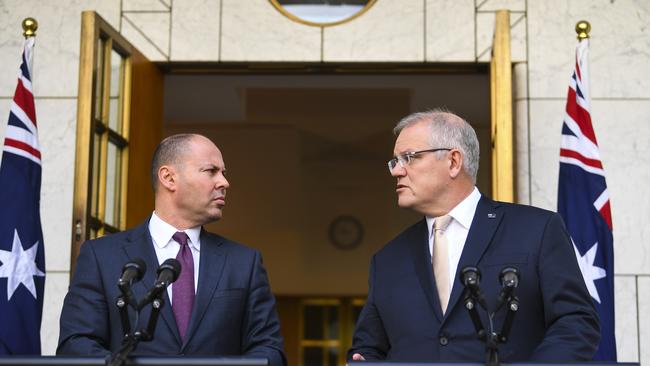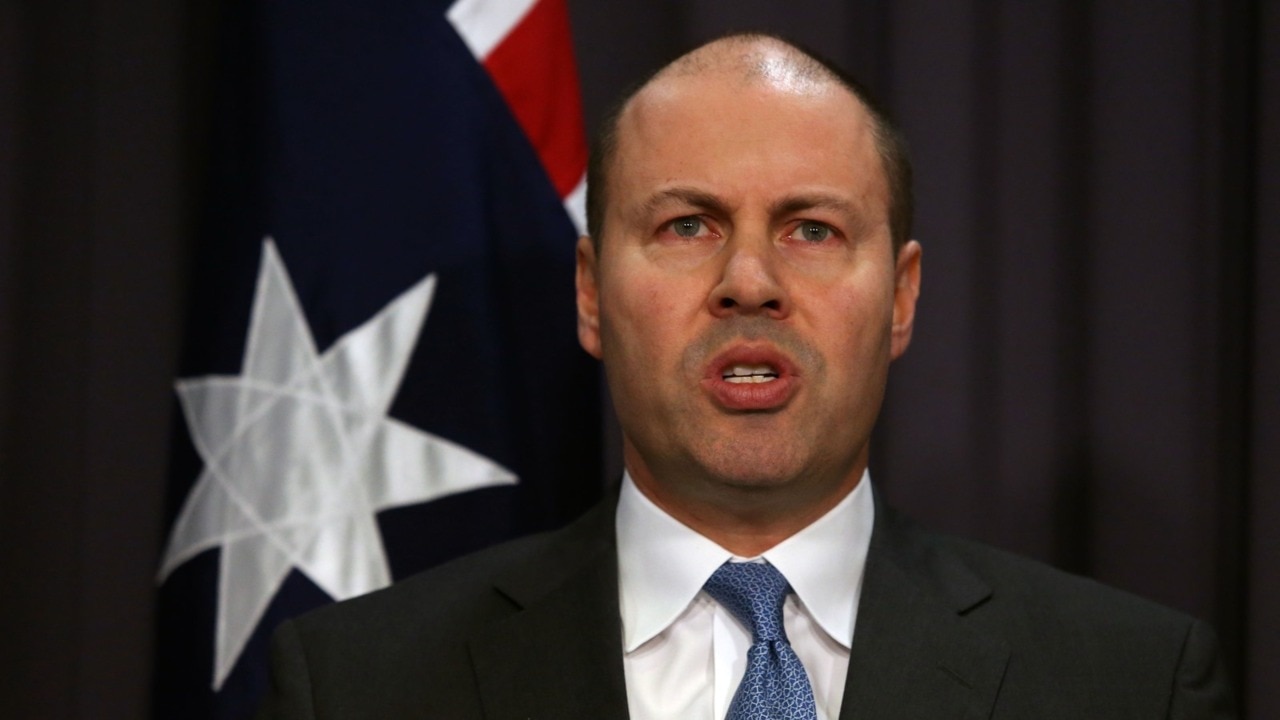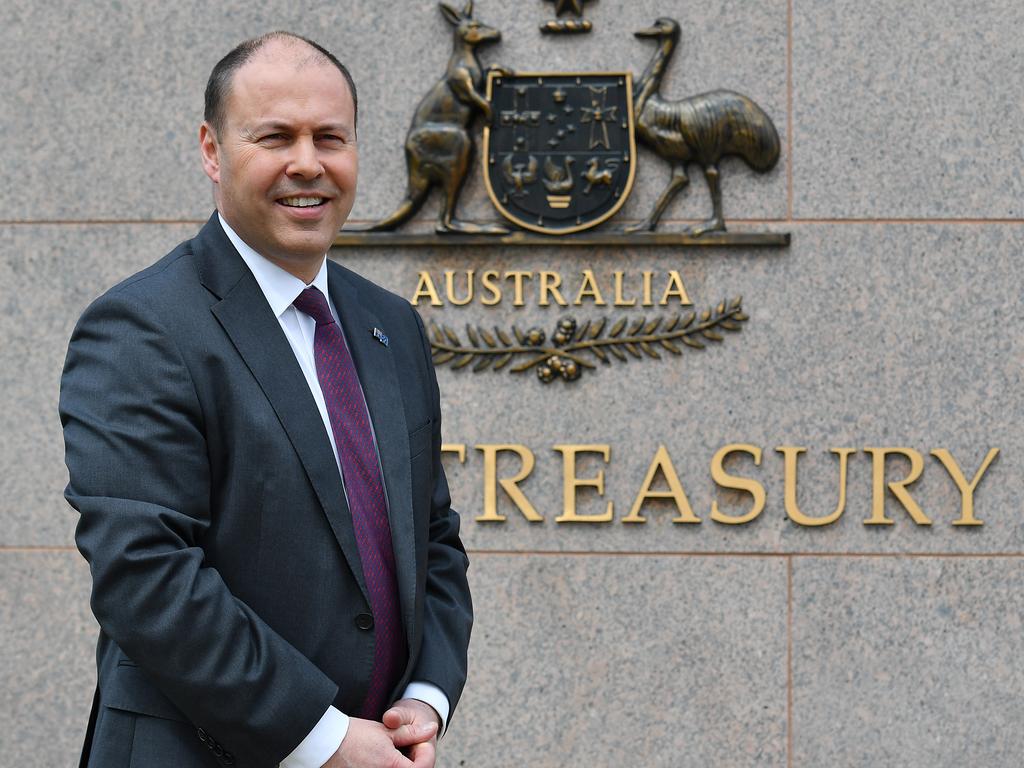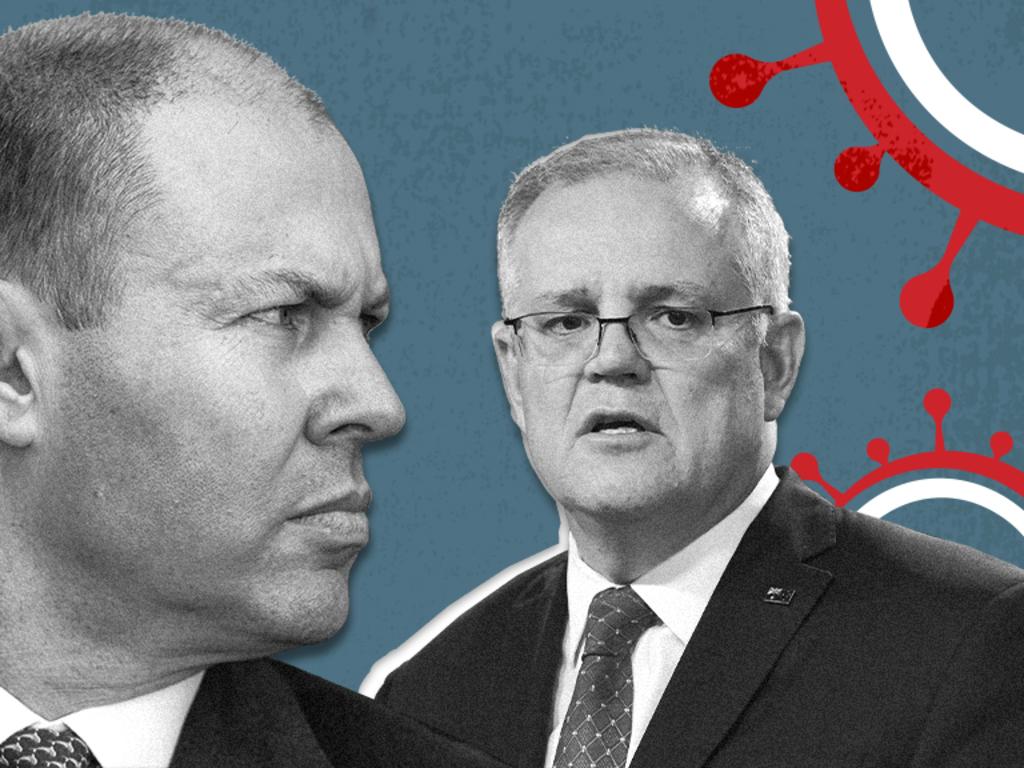Federal Budget: Tax breaks on the road to recovery
Average families will receive up to $5000 in income tax relief and young Australians will be targeted through a back-to-work wage subsidy.

Average families will receive up to $5000 in income tax relief and young Australians will be targeted through a back-to-work wage subsidy in a budget that will map a path to economic recovery and seek to prevent a lost generation of unemployed.
In the most important fiscal and economic statement to be delivered by a treasurer in more than 60 years, Josh Frydenberg will offer a jobs lifeline for up to 700,000 Australians aged under 35 who have been forced onto welfare payments.
He will also call on Australian households to turbocharge the post-pandemic economy through a revamped income tax plan that will deliver about $2000 to the average earner and more than double that for households.
The Australian understands the direct wage subsidy — a key centrepiece of the budget — will be limited to those under 35 and made to businesses taking on young Australians who have been forced on to JobSeeker during the COVID-19 pandemic.
The demand-driven budget spend will be underwritten by a new debt ceiling of more than $1.1 trillion and a deficit of just over $210bn, as revealed by The Australian on Monday.
The jobs boost, first flagged by The Australian last month, could potentially rescue hundreds of thousands of younger people from long-term unemployment and lower wages by offering incentives to move them off the welfare queue and back into the workforce.
Almost 700,000 Australians aged up to 35 were receiving JobSeeker and Youth Allowance payments at the end of August.
The wage subsidy aimed at leveraging businesses to drive new economic growth will help transition the economy off the $101bn JobKeeper program which will end next March.
The bringing forward of the already legislated second-stage tax cuts for low to middle-income earners by a year will be coupled with other income tax relief measures to be announced in Tuesday’s budget.

This is designed to inject billions of dollars back into the economy as the stood-down workforce and the unemployed are weaned off JobKeeper and JobSeeker payments. As of mid-September, almost 1.83 million Australians were listed under job-seeker programs.
Mr Frydenberg’s second budget will focus on restoring and creating millions of jobs, getting more cash into the pockets of Australian businesses and workers, and driving private sector investment through allowances and tax incentives.
The more contentious stage-three tax cuts for higher income earners, scheduled for post-2024, will not be brought forward.
Treasury had strongly urged the government to wean businesses off JobKeeper payments and introduce new supports to help get Australians back into work. In the JobKeeper review handed to Mr Frydenberg ahead of the July 23 economic and fiscal update, Treasury said “the government should consider support for other groups of people who are not employed”.
“In particular, investment in skills development for displaced workers and targeted wage subsidies aimed at people newly entering the labour market during a recession,” the Treasury review said.
Mr Frydenberg said his “focus has always been on creating jobs” through long-lasting reform and supporting businesses and households through the COVID-19 economic shock.
“We’ve announced already significant changes around energy, around insolvency, responsible lending and the provision of credit. Those are significant reforms. They’re long lasting reforms. The Digital Transformation Strategy we outlined, that’s a long lasting, permanent reform,” Mr Frydenberg told Sky News.
“But it’s combined with other measures that you’ll see in this budget, which are temporary, which are targeted, and which are designed to deal with the challenges we face.”
The government’s five to 10-year economic recovery blueprint will be anchored by the Prime Minister’s JobMaker plan, supported by a $1.5bn manufacturing plan, a shake-up of the energy system, industrial relations reform, $1.67bn cyber security strategy, multi-billion-dollar training and skills packages and more than $10bn in new infrastructure funding. Budget papers will also show Australia is facing its first negative net migration rate since 1946 and the lowest population growth in more than a century.

Employer groups, including the Australian Industry Group and Australian Hotels Association, have also been lobbying the government to support subsidies for new employees.
In its pre-budget submission, the AiGroup called for a national program providing wage support and incentives for businesses to hire workers, including new apprentices, trainees, cadets and interns. In the JobKeeper review, Treasury quoted the OECD economic outlook, which said as economies turn to recovery the policy mix should shift from job preservation to supporting a rapid recovery.
“While job-retention schemes may be effective in preserving existing jobs in the short term, these schemes may not be efficient in reallocating workers from unviable jobs to industries and firms with better medium-term growth prospects,” the OECD said.
The OECD said the policy challenge was to “move from blanket to targeted support to help workers transit to new jobs, ensure rapid firm restructuring and provide social protection to the most vulnerable”.
As part of a strategy to transition businesses and employers off JobKeeper, the government last week reduced payments from $1500 a fortnight to $1200. From January 4 to March 28, the JobKeeper rate will fall to $1000 a fortnight for eligible employees.
The Australian understands that in line with the delivery of other major stimulus supports during the pandemic, the government will use existing programs to deliver funding boosts for households and businesses in the budget.
The Boosting Cash for Employers scheme, announced in March, is pumping between $20,000 and $100,000 into the coffers of eligible small and medium-sized businesses and charities that employ people.
In a major pre-budget speech last week, Scott Morrison said the government was focused on reviving hundreds of thousands of jobs lost during the pandemic through his five-to-ten-year JobMaker economic recovery plan.
Mr Morrison — who announced a $1.2bn package on the weekend helping Australian businesses to employ 100,000 new apprentices and trainees — said in addition to the government’s $1bn JobTrainer program, the government was “working to recover what has been lost”.

“The more you open up, the more you get back on the front foot, the more you will see these jobs come back. That is potentially in the hundreds of thousands as we have already seen with the record jobs recovery that we have seen in the months up until now,” Mr Morrison said. “Now many of the things I have talked about aren’t just about jobs over the next three months. They’re about jobs over the next five years, over the next 10 years.”
Opposition treasury spokesman Jim Chalmers on Monday said the budget was framed in the “teeth of the deepest, most damaging recession we’ve seen in Australia for almost 100 years”.
“We confront a full-blown jobs crisis in this country with almost a million Australians unemployed and the Treasurer has said that he expects it to get worse before it gets better,” Mr Chalmers said.
“At risk here is a lost generation of Australian workers sacrificed to the first recession in this country in three decades.”
Labor has attacked the government’s lack of focus on providing support for women, with Mr Chalmers declaring “we need to make sure that there is proper investment in jobs that recognises that women are concentrated in industries like the care economy”.
Finance Minister Mathias Cormann on Monday described the budget as “pro-growth, pro-recovery” and said the government would continue providing support to “get through this crisis in the best possible way”.
Senator Cormann also called on Labor to not “stand in the way” of fast-tracked personal income tax cuts, indicating the tax relief package could be backdated to July.







To join the conversation, please log in. Don't have an account? Register
Join the conversation, you are commenting as Logout